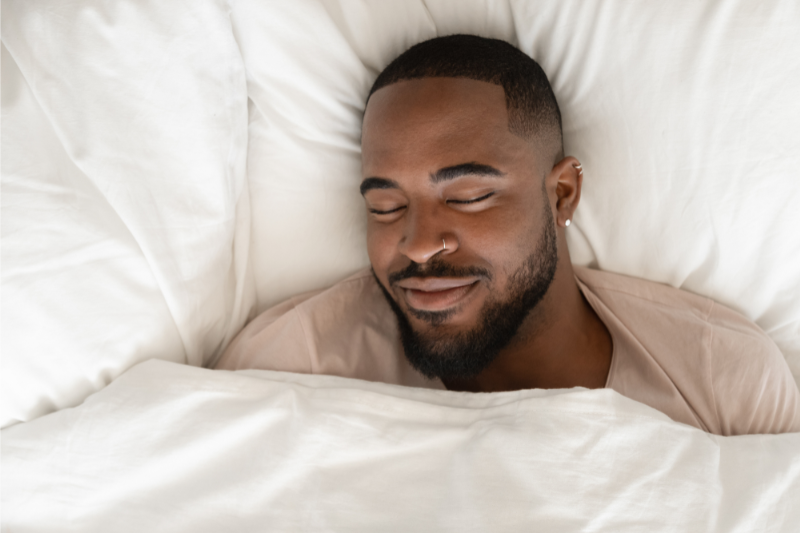Have you ever woken up feeling paralyzed, unable to move or speak? If so, you might have experienced sleep paralysis, a phenomenon that can be quite frightening. But can sleep paralysis actually cause breathing problems? Let’s look at the relationship between these two experiences, explore some helpful strategies for managing them, and how to see a specialist for sleep disorders in Midtown, New York.
Understanding Sleep Paralysis
Sleep paralysis is a temporary state of involuntary immobility that occurs during sleep-wake transitions. It usually happens as you’re falling asleep (hypnagogic) or waking up (hypnopompic), leaving you aware of your surroundings but unable to move your body. This can be accompanied by hallucinations, both visual and auditory, making the experience even more unsettling. These hallucinations can be very vivid and can range from a sense of presence in the room to terrifying figures or scenarios.
While sleep paralysis can occur during either sleep stage, it’s more common upon waking. Importantly, not everyone who experiences sleep paralysis has an underlying sleep disorder in Midtown, NY, like narcolepsy. For many, it’s an isolated event. However, people with narcolepsy are much more likely to experience frequent sleep paralysis.
Mechanisms of Sleep Paralysis and Breathing
Muscle Atonia
During REM (Rapid Eye Movement) sleep, the brain triggers muscle atonia, a temporary paralysis that prevents you from acting out your dreams. This is a natural safety mechanism. However, sometimes, this atonia can extend briefly into wakefulness, causing the feeling of being unable to move during sleep paralysis.
The good news is that muscle atonia typically doesn’t affect the muscles responsible for breathing. Your respiratory system continues to function automatically, ensuring you get the oxygen you need. Even though it may feel difficult to breathe due to the anxiety and panic that can accompany sleep paralysis, your body is still getting enough oxygen.
Psychological and Physiological Stress
The experience of sleep paralysis itself can be quite stressful, triggering anxiety or even panic. This heightened emotional state can lead to shallow, rapid breathing. However, it’s important to remember that this is a temporary reaction to the situation, not a true breathing difficulty. Focusing on calming yourself down can help regulate your breathing.
Co-occurrence with Sleep Disorders
While sleep paralysis can occur independently, it’s more prevalent in individuals with sleep disorders in Midtown, NY, like sleep apnea or narcolepsy. These disorders can disrupt sleep patterns and may indirectly affect breathing, particularly during sleep. People with sleep apnea may experience periods where their breathing is interrupted or becomes very shallow. Likewise, people with narcolepsy may experience fragmented sleep or cataplexy, a sudden loss of muscle control triggered by strong emotions.
Common Misconceptions and Clarifications
Experiences vs. Real Risks
It’s important to dispel the misconception that sleep paralysis itself can cause suffocation. While the experience may feel frightening, the vast majority of people with sleep paralysis breathe normally throughout the episode. Accurate information can help alleviate some of the anxiety associated with sleep paralysis. People who have had sleep paralysis often report feeling a sensation of pressure on their chest, which can further heighten the fear of suffocation. However, this pressure is not caused by any actual restriction of breathing.
Cultural Variations in Sleep Paralysis
Sleep paralysis has been documented in cultures around the world throughout history. However, the way people interpret these experiences can vary greatly. In some cultures, sleep paralysis is attributed to supernatural forces, such as demons or malevolent spirits. In other cultures, it may be seen as a spiritual experience or a form of communication with the spirit world. Understanding these cultural variations can help us appreciate the wide range of human experiences and reactions to sleep paralysis.
Clinical Perspectives and Recommendations
Managing Sleep Paralysis Symptoms
If you experience sleep paralysis, understanding its benign nature can be incredibly helpful. Knowing that you’re not suffocating and that the episode will pass can significantly reduce anxiety. Relaxation techniques like deep breathing exercises can also be beneficial during and after an episode. Focusing on slow, controlled breaths can help calm your nervous system and ease the feeling of being unable to breathe.
Medical Evaluation
Healthcare professionals, like Kamelhar Pulmonology, can play an important role in assessing underlying sleep disorders in Midtown, NY, that might be contributing to sleep paralysis. If you experience frequent episodes or have concerns about your breathing during sleep, contact Kamelhar Pulmonology. They can conduct a sleep study to rule out any underlying conditions. A sleep study can involve spending a night in a sleep lab where your brain waves, muscle activity, and breathing patterns are monitored.
Personal Strategies and Coping Mechanisms
Sleep Hygiene Practices
Developing healthy sleep habits can significantly improve your sleep quality and potentially reduce the frequency of sleep paralysis episodes. This includes establishing a consistent sleep schedule, creating a relaxing bedtime routine, and maintaining a sleep-conducive environment. Here are some specific tips:
- Go to bed and wake up at the same time each day, even on weekends.
- Avoid caffeine and alcohol close to bedtime, as these substances can disrupt sleep.
- Create a relaxing bedtime routine that might include taking a warm bath, reading a book, or practicing relaxation techniques.
- Make sure your bedroom is dark, quiet, and cool.
- Avoid using electronic devices in bed, as the blue light emitted from screens can interfere with sleep.
Stress Management Techniques
Additionally, managing stress through exercise, relaxation techniques, and addressing any underlying anxieties can further decrease the likelihood of sleep paralysis. Stress can be a major trigger for sleep paralysis, so finding healthy ways to manage stress can be very beneficial. Here are some ideas for stress management:
- Regular exercise is a great way to reduce stress and improve sleep quality. Aim for at least 30 minutes of moderate-intensity exercise most days of the week.
- Relaxation techniques such as deep breathing, progressive muscle relaxation, and meditation can all help to reduce stress and improve sleep.
- If you have underlying anxiety, addressing it through therapy or medication can also help to reduce the risk of sleep paralysis.
Conclusion
Sleep paralysis is a temporary and non-life-threatening phenomenon, although it can be a frightening experience. While it may cause temporary shallow breathing due to the associated anxiety, it doesn’t impede your ability to breathe. If you experience sleep paralysis, remember that you’re not alone. By understanding the condition, practicing good sleep hygiene, managing stress, and implementing relaxation techniques, you can effectively manage your symptoms and get a good night’s sleep.
A board-certified sleep specialist can provide personalized guidance and ensure you get the restful sleep you deserve. Here at Kamelhar Pulmonology, we have a team of experienced professionals who can help you diagnose and treat sleep disorders, in Midtown, NY, including sleep paralysis.
Contact us today to learn more about our services or to schedule an appointment.



